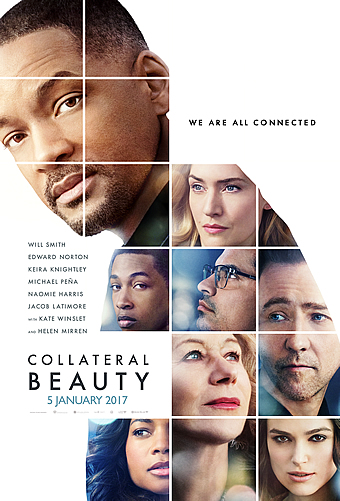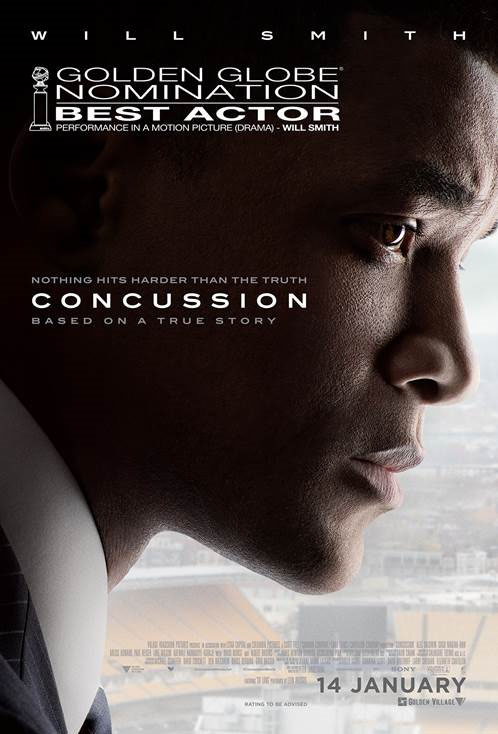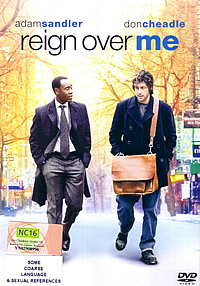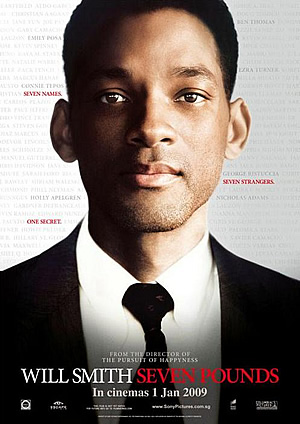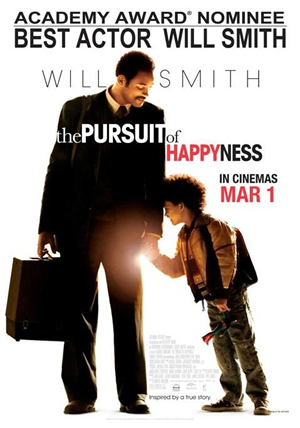COLLATERAL BEAUTY (2016)
Genre: Drama
Director: David Frankel
Cast: Will Smith, Edward Norton, Keira Knightley, Michael Peña, Naomie Harris, Jacob Latimore, Kate Winslet, Helen Mirren
Runtime: 1 hr 34 mins
Rating: PG13 (Brief Coarse Language)
Released By: Golden Village Pictures
Official Website: http://collateralbeauty-movie.com
Opening Day: 5 January 2017
Synopsis: When a successful New York advertising executive suffers a great tragedy he retreats from life. While his concerned friends try desperately to reconnect with him, he seeks answers from the universe by writing letters to Love, Time and Death. But it's not until his notes bring unexpected personal responses that he begins to understand how these constants interlock in a life fully lived, and how even the deepest loss can reveal moments of meaning and beauty.
Movie Review:
Love, time and death – three abstractions that connect every human being on Earth; because, as advertising guru Howard Inlet tells the staff of his company at the beginning of the movie, ‘we long for love, we wish we had more time, and we all fear death’. Not surprisingly, these same three elements become running themes in Will Smith’s latest feel-good tearjerker (think ‘Seven Pounds’ and ‘The Pursuit of Happyness’), albeit through an unnecessarily convoluted, arguably absurd and unequivocally contrived setup. As you probably already know, ‘Collateral Beauty’ unfolds in the wake of the unfortunate demise of Howard’s six-year-old daughter, which plunges him into depression and causes him to rail against the very abstractions he embraced before, i.e. in the form of angry letters addressed to Love, Time and Death that he even makes the effort to drop off in the postbox opposite his rented apartment.
That’s not the end of it, not even close in fact; to save the company from being dragged down in Howard’s tailspin, his three co-workers/ partners Whit (Edward Norton), Claire (Kate Winslet) and Simon (Michael Pena) decide to pay three struggling theatre actors Amy (Keira Knightley), Raffi (Jacob Latimore) and Brigitte (Helen Mirren) to play Love, Death and Time respectively. The intention is by no means noble – with the help of a private investigator (Ann Dowd) that they had hired to follow Howard in the first place, his supposed friends aim to use the personifications of these three abstractions to engage him in public and record footage of such confrontations, thus proving to the board of the company that he is mentally incapable and force Howard’s hand to sell off his majority share. Notwithstanding their initial reluctance and persistent reservations towards Whit’s plan, it still is a decidedly bastardly move, which Brigitte persuades Amy to go ahead with for the money to be able to put up their own stage performance.
But Howard’s recovery isn’t the only motivation here; as Whit teams with Amy, Claire with Raffi, and Simon with Brigitte, it becomes clear that Allan Loeb’s screenplay is just as concerned with Whit’s estrangement from his teenage daughter, Claire’s yet-unfulfilled hope to be a mother, and Simon’s inability to tell his family that he is sick and possibly dying. Because Whit, Claire and Simon need help with Love, Time and Death respectively, too little focus is placed on Howard and his own loss – especially missing is the bond between him and his daughter Olivia, apart from a recurring scene of him swinging his daughter around. Where it does find time for Howard, those precious moments are unfortunately lost on scenes with him and grief counsellor Madeleine (Naomie Harris), who runs a support group for parents who have lost their children – not only because of a disingenuous twist towards the end about Howard and Madeleine’s relationship, but also because of the titular concept that sounds disingenuously like New Age Philosophy 101.
Ah yes, so much has been said about love, time and death that the entire notion of ‘collateral beauty’ seems to have been forgotten. Madeleine will relate her own experience of losing her kid to explain it to Howard, but the long and short of it is to not be buried in one’s grief but to see and recognize the beauty which still exists all around. Intriguing as it sounds, it really isn’t as deep or inventive as it appears to be; worse still, more than love, time or death, this rather simplistic concept ironically remains an abstraction throughout the film, simply because so little time is spent developing it or fleshing it out. Its impact is also diminished because of how it comes through a second, only slightly less, disingenuous twist that underscores how needlessly protracted the entire setup was in the first place – specifically, why Love, Death and Time needed to come through three actors – and opens up a gaping plothole that not Loeb or his director David Frankel is capable of glossing over adequately.
Neither for that matter does Frankel manage to smooth over the unwieldiness of the narrative itself that seems perpetually encumbered by too many characters fighting for attention over a seemingly compact but ultimately plodding 96 minutes. Thankfully though, he has an enormously appealing A-list ensemble to add weight to the paper-thin characters, led of course by the always watchable Smith who does his darnest to emote in the few scenes he is allowed to express his anguish. Norton, Winslet and Pena have good rapport, while Knightley, Latimore and Mirren inject some much-needed verve into the proceedings. Why each of these talented actors agreed to such bit roles is perplexing, but one imagines that there must have been a point where the movie was compared to a modern-day ‘Love Actually’, as much as the final product turns out far short.
‘Collateral Beauty’ won’t be the first time Hollywood has tried at holiday-season treacle, but even as undemanding sentimental eggnog, it is hardly as moving or poignant as it needs to be. To centre a story on the elements of love, time and death is interesting in and of itself, but it seems the filmmakers are quite at a loss how to develop it into something compelling. The same can be said of the idea of ‘collateral beauty’, which turns out shallow and pretentious. Since the movie seems to be hooked on the law of ‘threes’, here’s three abstractions it could do a lot more of – Truth, Empathy and Authenticity; Truth so that we do not feel ‘gas-lighted’ by its twists, Empathy so we care more for each one of its characters, and Authenticity so that the emotions it deals with and wants us to feel come off real and genuine. That’ll be the beauty, we say.
Movie Rating:


(Unfocused, under-developed and disingenuous, this holiday-season feel-good tearjerker does not earn your emotions, your intelligence and ultimately your time)
Review by Gabriel Chong
You might also like:
